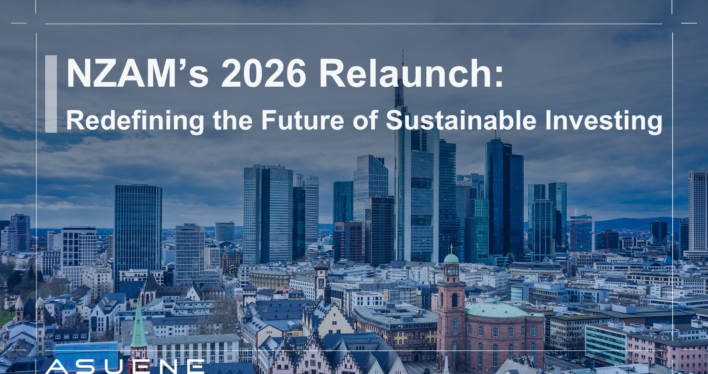- Article Summary
-
Introduction: A Turning Point for Global Sustainable Finance
The United Nations-backed Net Zero Asset Managers (NZAM) initiative has announced its relaunch for January 2026, marking a new chapter in the evolution of sustainable investing. Following months of suspension and internal review, NZAM will return with a redefined framework that no longer requires signatories to commit to achieving net zero by 2050. Instead, the group aims to create a more inclusive, flexible structure that accommodates diverse jurisdictions and market realities.
The decision follows a year of turbulence in the ESG landscape. In early 2025, NZAM paused its operations shortly after BlackRock, the world’s largest asset manager, exited the coalition. The pause was meant to reflect on regulatory and political pressures, particularly from the United States, where anti-ESG sentiment and litigation had intensified. The relaunch announcement signals a shift from rigid global alignment to a practical model designed to sustain participation across regions.
Understanding NZAM and Its New Framework
The Net Zero Asset Managers initiative (NZAM) was launched in December 2020 under the umbrella of the United Nations Framework Convention on Climate Change (UNFCCC) Race to Zero campaign. It brings together asset managers from around the world who commit to supporting the goal of net zero greenhouse gas emissions across their portfolios. NZAM encourages its signatories to align investment strategies with the Paris Agreement, which aims to limit global temperature rise to well below 2°C and pursue efforts to restrict it to 1.5°C.
At its inception, NZAM quickly grew to include more than 300 asset managers representing over 70 trillion dollars in assets under management. Signatories were expected to set interim targets for 2030, align their portfolios with a 2050 net zero trajectory, and report annually on progress toward those goals. The initiative served as a central pillar of global climate finance, linking investors, asset owners, and policymakers around a shared vision of sustainable capital allocation.
However, in January 2025, NZAM suspended its operations to reassess its commitments amid regulatory divergence and rising political pressures. The group’s 2026 relaunch introduces a refined framework that removes the explicit 2050 target requirement while maintaining alignment with the Paris Agreement. This change reflects the initiative’s desire to accommodate participants from diverse markets, including emerging economies and jurisdictions with varying policy environments.
Under the updated structure, signatories will continue to set individualized decarbonization plans, apply stewardship practices, and publish annual progress reports. NZAM’s new model emphasizes flexibility, collaboration, and inclusivity. The coalition aims to maintain ambition while allowing each member to pursue context-appropriate pathways toward net zero, ensuring continued engagement from major financial institutions and emerging market participants.
Global ESG Under Pressure: Diverging Paths and Market Tensions
The global ESG investment landscape is showing widening gaps between regions as asset managers navigate differing political and regulatory expectations. In the United States, sustainable finance has come under scrutiny as several states introduce anti-ESG legislation and legal challenges targeting financial institutions that integrate climate considerations into investment decisions. In contrast, Europe continues to embed sustainability into financial regulation, advancing frameworks such as the Corporate Sustainability Reporting Directive (CSRD) and the Sustainable Finance Disclosure Regulation (SFDR).
State Street’s recent decision illustrates these diverging approaches. The firm withdrew its U.S. operations from NZAM while keeping its European and UK divisions within the coalition, citing strong client demand in those markets for sustainable investment strategies and climate reporting. This decision underscores how regional political climates shape institutional strategies: European clients and regulators continue to push for stronger ESG integration, while many U.S. entities are tempering their commitments under growing domestic pressure.
These contrasts have encouraged some global investors to rethink their engagement with climate alliances. BlackRock, Vanguard, and several major firms have scaled back participation in groups such as NZAM and Climate Action 100+, emphasizing how political and market realities are influencing global cooperation. At the same time, European pension funds and institutional investors, including The People’s Pension in the UK and PFZW in the Netherlands, have shifted assets to managers that demonstrate credible climate alignment. This movement shows that despite political headwinds elsewhere, sustainable investing remains resilient and even accelerating in Europe.

Corporate Implications: Aligning Strategy with Investor Expectations
For corporations, NZAM’s redefined framework does not mean a relaxation of climate responsibility. Investors continue to expect clear emissions disclosure, credible decarbonization pathways, and progress verification through science-based targets. Companies that provide measurable data and transparency will remain competitive in attracting ESG-aligned capital.
This evolving investor landscape highlights the importance of consistent, verifiable reporting systems. Organizations like ASUENE support companies in tracking and managing emissions across their value chains, aligning corporate strategies with frameworks such as the Science Based Targets initiative (SBTi) and the Task Force on Climate-related Financial Disclosures (TCFD). As NZAM shifts toward flexibility, companies must maintain scientific integrity to preserve investor confidence and long-term resilience.
Conclusion: A More Inclusive Future for Sustainable Investing
NZAM’s 2026 relaunch represents a transition toward a mature, adaptive phase of sustainable finance. The decision to move away from a single global target allows the initiative to accommodate diverse regional realities while maintaining focus on the Paris Agreement’s temperature goals. This approach may encourage broader participation from markets previously hesitant to commit to uniform timelines.
The future of sustainable investing will depend on collaboration between investors, companies, and policymakers who can balance ambition with practicality. By embracing transparent data and credible science-based frameworks, the financial sector can continue to advance global decarbonization. ASUENE will remain at the forefront of supporting this progress by enabling companies to transform their sustainability strategies into measurable, verifiable action.
Why Work with ASUENE Inc.?
ASUENE is a key player in carbon accounting, offering a comprehensive platform that measures, reduces, and reports emissions. ASUENE serves over 10,000 clients worldwide, providing an all-in-one solution that integrates GHG accounting, ESG supply chain management, a Carbon Credit exchange platform, and third-party verification.
ASUENE supports companies in achieving net-zero goals through advanced technology, consulting services, and an extensive network.


